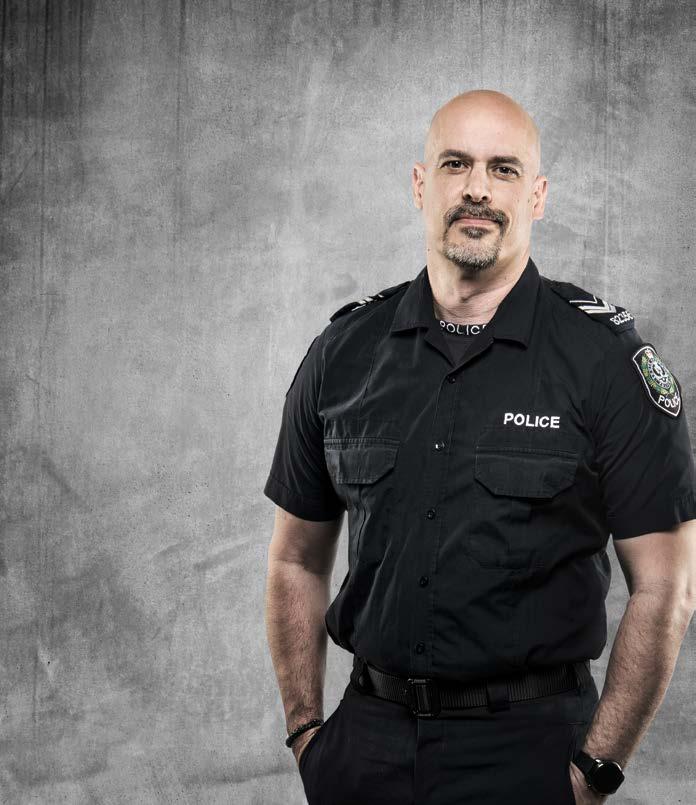
“… if you're pushed because of the nature of conditions and how the job's changed from what it should be, then, yeah, (leaving) would be a real possibility.”
Staying in the job, Dad?
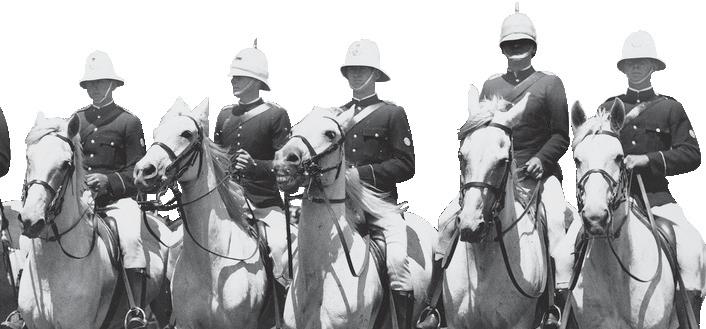



“… if you're pushed because of the nature of conditions and how the job's changed from what it should be, then, yeah, (leaving) would be a real possibility.”
Staying in the job, Dad?


Police officers face unique challenges when it comes to maintaining a healthy diet. Irregular shift patterns, and the unpredictability of their duties make nutritious eating hard.
Often, meals are on the go or at odd hours. The stress of the job can lead to eating sugary snacks or having caffeineladen drinks.
Yet, eating well is essential for being ready to respond in high-pressure situations. With the right strategies, police can fuel their bodies and minds to perform at their best.
So what can you do?
Here’s our top three tips that are small and manageable changes that make an excellent foundation for achieving your health and wellness goals.
1. Plan out your week
Sit down and plan out what you're going to eat for the next few days, what you need to buy from the grocery store and what you need to prep. Plan when you will eat your meals and what time you will have your snacks so that you feel in control of each day. If you know what you will be eating, and when, you will be less likely to reach for a quick energy fix or chocolate bar.
2. Use a tracker
According to data from the CSIRO Total Wellbeing Diet+, members who consistently used a Food and Exercise Tracker reported greater adherence to their meal plans and an increased sense of control over their eating habits.
Whether it's through a mobile app, a printed log, or even quick notes in a diary, keeping track of what you eat and drink can make a significant difference in building long-term healthy habits.

*Eligibility criteria and other terms and conditions apply + CSIRO. (2023). Long-term weight loss: Summary of findings from the CSIRO Total Wellbeing Diet Program.
3. Make recipes in bulk
When you have time, or time off, try making some meals in bulk portions and freezing them in portions.
When you finish a shift, you'll have a defrosted serving ready to eat. This saves you time and money.
Total Wellbeing
And if you’re a Police Health member who meets the eligibility criteria, you have another ace up your sleeve – the CSIRO Total Wellbeing Diet Program.
Expected to launch in March 2025, it’s a bespoke program for shift workers needing support to establish and maintain healthy habits*.
Registrations of interest are now open –Google “total wellbeing diet police health” to find out more.

Afew things stand out about Jamestown brevet sergeant Nathan Paskett One is obvious: his American accent Another is his endlessly calm demeanour. He’s the kind of bloke who, without a hint of emotion, can offer a stinging criticism. No raised voice, no scowl, and no anger.
Just as fascinating as his character is the life he’s led. As the son of an American, he spent a 10-year chunk of his childhood living in California but wound up back in country SA And, today, at just 46, he and wife Kylie are the parents of nine children and grandparents of 11
At a career crossroad, as he studied at university 20-plus years ago, he dropped the occupation he was headed for to pursue policing But, as he sees it, policing today is in crisis and, about that, he offers one of those calm but stinging criticisms
Brevet Sergeant Lance Grant and the Tibetan mastiff he rescued featured in the Police Journal back in 2017 That feature drew the attention of author Melody Horrill And, once she’d seen it, she knew she wanted to expand on the story of Lance and George in the book she was writing, Sheltered.
The complaints-investigation process continues to cause members unhealthy levels of stress, ongoing uncertainty, and financial disadvantage With anonymity, one member tells of his experience at the hands of the system
Police Association assistant secretary Steve Whetton explains why SAPOL needs to make itself more accessible to job applicants from the regions
Dr Rod Pearce looks at the problem of dry eyes and the relevance of tears; lawyer Daniel Weekley considers the confidentiality provisions of the Police Complaints and Discipline Act ; Jim Barnett road-tests the Kia Carnival and Nissan Pathfinder
Unwilling to accept the suffering caused to members by the flawed complaints-investigation process, Police Association president Wade Burns makes a compelling case for change.
Brett Williams
brettwilliams@pj asn au

Publisher: Police Association of South Australia Level 2, 27 Carrington St, Adelaide SA 5000 T (08) 8212 3055
Editor: Brett Williams (08) 8212 3055 Design: Sam Kleidon 0417 839 300
Advertising: Police Association of South Australia (08) 8212 3055
Printing: Finsbury Green (08) 8234 8000
The Police Journal is published by the Police Association of South Australia, 27 Carrington St, Adelaide, SA 5000, (ABN 73 802 822 770). Contents of the Police Journal are subject to copyright. Reproduction in whole or in part without written permission of the Police Association of South Australia is prohibited. Opinions expressed are not necessarily those of the editor. The Police Association accepts no responsibility for statements made by advertisers. Editorial contributions should be sent to the editor (brettwilliams@pj.asn.au).
COVER: Brevet Sergeant Nathan Paskett. Photography by Steve McCawley.


Can the SAPOL executive truly be said to value its people when assets like Nathan Paskett start talking to their families about other career options?
It delighted Brevet Sergeant Lance Grant when author Melody Horrill asked him to tell her about his beloved rescue dog for her book, Sheltered
From the complaints-investigation process, members continue to emerge as victims suffering lasting psychological damage

EXECUTIVE

Level 2, 27 Carrington St, Adelaide SA 5000
www.pasa.asn.au
P: (08) 8212 3055 (all hours)
E: pasa@pasa.asn.au
Membership enquiries: (08) 8112 7988



MEDIA AND COMMUNICATIONS


REPRESENTATIVES
Superannuation
Michael Kent
Leave Bank Andrew Heffernan
Country housing Andrew Heffernan
Commissioner’s Office Health Safety & Welfare Advisory Committee Steven Whetton
Legacy
Sexual Orientation, Gender Identity & Intersex members
DELEGATES & WORKPLACE REPRESENTATIVES
Metro North Branch
Elizabeth Haydn Evans
Golden Grove Darren Quirk
Henley Beach Alan Pagac
Holden Hill James Cochrane
Northern Prosecution Tim Pfeiffer
Northern Traffic Neil Hastie
Parks
Julian Snowden
Nadia Goslino and Andrew Heffernan
Country South Branch
Adelaide Hills Jason Blucher
Berri
Tamara Day
Millicent Tanya Payne
Mount Gambier
Renmark
Edward Matias
Port Adelaide Paul Blenkiron
Salisbury Philip Proctor
Country North Branch
Coober Pedy
Patrick Larkins
Kadina Gavin Moore
Peterborough Nathan Paskett
Port Augusta Jake Whenan
Crime Command Branch
DOCIB David Furniss
Intel Support Shaun Blundell
Major Crime Phil Buttfield
Port Adelaide Scott Mitchell
Serious Fraud
Robert Plenderleith
South Coast Luke Watts
Metro South Branch
Adelaide Stuart Mee
Christies Beach/Aldinga Gary Craggs
Netley Robert Brelsford
Southern Prosecution Sallie McArdell
Sturt Richard Hoar
Robert Martin
James Bentley
Operations Support Branch
Academy
Band
ComCen
Melanie Smith
Adam Buckley
Glenys Moriarty
Dog Ops Levi Struthers
Firearms
Brett Carpenter
Human Resources Eugene Wasilenia
Mounted Ops Sonia Wellings
STAR Operations Craig Murphy
State Tac/Op Mandrake Duncan Gerrie
Traffic Services Benjamin Bowey
Traffic Services Joshua O’Dwyer
Officers Branch Constantinos Kyriacou

The Police Association Members Buying Guide offers members and their families massive exclusive discounts on a wide range of goods and services. The easiest way to access all the discount codes is to join the private Facebook Group at facebook.com/groups/membersBuyingGuide

Wade Burns PRESIDENT
There’s no easy way to describe the disturbing injustices currently unfolding within the SAPOL internal disciplinary system.
To put it bluntly: the system has become a disaster, one which frequently wrecks the mental and physical well-being of police officers and their families
Of course, members are well aware that none of these issues are new, but they’ve become exponentially worse over the last decade
Even the recent Select Committee on Support and Mental Health Services for Police couldn’t ignore this as an issue of critical importance
One of the committee’s recommendations was for the administration of the Police Complaints and Discipline Act to be better resourced to ensure faster resolutions for members
… SAPOL is also renowned for its appalling lack of communication to members about the progress of disciplinary matters.

The final report of the committee highlighted that:
“Unnecessary delays to the resolution of such proceedings can have a significant impact on the mental health of officers…
“Such proceedings may be with respect to matters relatively minor in nature
“Resources must be committed to ensure such delays are minimised to the extent possible ”
It’s a good start, but it doesn’t go far enough to fully address the issue
That’s because a lack of resourcing, though one part of the problem, is not the entire story.
A big part of the problem is ideological, and policy driven . The SAPOL disciplinary system is perennially clogged up with what any reasonable person would consider minor breaches of conduct
And, because of its convoluted disciplinary framework, those matters often go all the way to the pointy end of the disciplinary system — to Internal Investigation Section, Professional Conduct Section, or the Diversity and Inclusion Branch
Sometimes, matters make it all the way to the Police Disciplinary Tribunal, only to later be withdrawn after months — sometimes even years — of delays.
We already know that SAPOL’s internal disciplinary processes deny police officers the right to silence
Unlike other citizens, police are compelled to answer questions
But SAPOL is also renowned for its appalling lack of communication to members about the progress of disciplinary matters
And, often, when a member is informed that he or she is under investigation, SAPOL keeps the member waiting — sometimes for weeks or months — until it formally provides the allegations
One part of this problem could be resolved with a simple ideological reform: SAPOL should commit to having minor matters routinely resolved at the managerial level with minimal formality and technicality.
In one recent matter, after the Police Association prompted SAPOL, it advised that the member appeared “eligible for sanction” under the “Early Sanction Model”.
SAPOL clearly has its own definition of “early”, given the matter has been ongoing for nearly 300 days
Alternatively, when matters are finalized, SAPOL often neglects to advise the member in question
The entire system is symbolic of the crippling bureaucracies that now infect so many levels of the organization
And, as always, members — not top brass — are the ones who wind up paying the price.
There are members currently in the system who have been under the hammer of IIS for one, two, three and even four years.
One part of this problem could be resolved with a simple ideological reform: SAPOL should commit to having minor matters routinely resolved at the managerial level with minimal formality and technicality
There was once a time in SAPOL when this did occur
But, now, members live in fear they’ll be punished by the system if they neglect to escalate even the most trivial of conduct breaches.
Adding to the weaponization of disciplinary processes is SAPOL’s tyrannical and blanket use of what it calls “administrative orders”
These are, in reality, a means by which SAPOL can impose on members excessively restrictive conditions — which can often appear to have little or no direct relevance to the alleged conduct breach
An administrative order can be served on a member at any stage of the complaint or report process . It is a mechanism used to change members’ work duties or impose a range of workplace restrictions on them
These orders often rob members of relieving opportunities, secondments and promotions for extended periods
While SAPOL will claim these orders aren’t punitive, it is a fact that members are often financially penalized with a loss of operational shift penalties or allowances
Significant delays in promotion also impact their salary, superannuation and future anniversary dates
I’ve seen this result in severe injustices and the active restraint of members’ career prospects
The old maxim “justice delayed is justice denied” certainly applies here. SAPOL should, in the interests of fairness and accountability, implement strict organizational timeframes that apply from the opening of an investigation all the way through to its finalization
In mid-February, I sent SAPOL a list of 21 parameters it must address in order to begin the tall order of uncovering why, and how, these processes have become so malevolent toward members
If SAPOL is serious about the welfare of its workforce, it will work with us to identify and uncover the resourcing, bureaucratic and ideological problems existing within its internal disciplinary framework .
It’s on SAPOL to commission a comprehensive review into its faulty internal disciplinary framework, and the administration of its processes, to stop this system ruining members’ lives
See Under investigation and, therefore, just a number on page 24
SAPOL’s ongoing inability to reach its funded establishment staffing figure has been a topic of interest in several media interviews I’ve undertaken recently
Wade Burns
At times, SAPOL has been nearly 200 police officers short of that figure, which currently sits at around 140 (In reality, it’s higher, given that probationary constables-in-training are included in the headcount.)
SAPOL did forecast earlier this year that it would get much closer to having its district policing model “fully staffed” by June 30, 2025
The data shows that in 2018, 33 per cent of an operational member’s shift was dedicated to proactive policing That figure dropped to 3 per cent after SAPOL rolled out the DPM — a policing model which remains without member confidence.
It’s also no secret that SA police officers have become the last line of defence for other agencies that put issues in the too-hard basket.
This is particularly true when it comes to mental-health taskings, which are taking up inordinate amounts of members’ time
For the record, the SAPOL executive leadership team has highlighted that it aims to return to within 43 positions of full establishment by June 30 this year
At
times, SAPOL has been nearly 200 police officers short of that figure, which currently sits at around 140. (In reality, it’s higher,
given
that
probationary constables-in-
training are included in the headcount.)
The Australian Electoral Commission released the results of the 2025 Police Association general election in March.
I was humbled to find that members had given me their overwhelming support and, therefore, re-elected me as president
To win such a strong endorsement, with nearly 70 per cent of the vote, proves that our strategies, our methods and our skills have us heading in the right direction — and delivering outcomes for members
Though I’ve only had about nine months in the job after initially winning a by-election last July, I’ve been very clear to members about my objectives.
Members, too, have made it just as clear which issues they want the association to pursue with SAPOL and the government over the next term
We’re already full steam ahead on that agenda
I congratulate not only the other members who won their election races but also each of those who nominated for a position
Owing to a Supreme Court decision, the Police Association no longer uses the GLI beneficiary forms Existing forms held at the association have been destroyed
Now, in the case of the death of a member, the GLI benefit (currently $300,000) will be paid to his or her estate
Accordingly, the association’s strong advice is that you ensure that your estate is well-administered This is best achieved by having a valid will.
Tindall Gask Bentley Lawyers provides a free legal advice service to Police Association members and their families, and retired members To make an appointment to receive free preliminary legal advice covering all areas of law, particularly families and wills, members should contact the Police Association (08 8212 3055).

From the redefined SANTA FE and the dynamic TUCSON, to the bold KONA and the cutting-edge IONIQ 5 and IONIQ 6, our electric and hybrid range reflects our commitment to a cleaner tomorrow.
Hyundai Australia thanks the South Australian Police for their support to the community. In appreciation, National Fleet Pricing is now available across the entire Hyundai model range (excluding N models).
Contact your local Hyundai Dealer today.

Explore range
BY BRETT WILLIAMS
He is a police officer, a husband, a father, a university graduate, a union delegate, a Down syndrome advocate and a PTSD survivor. It all makes Nathan Paskett hugely valuable to policing, but can SAPOL hold on to him?


was the tipping point for Jamestown brevet sergeant Nathan Paskett A missing-person search had ended with the discovery of a decomposing adult body in a ravine It was up to police – who had detected the smell of death from more than 100 metres away – to undertake the recovery effort
The missing man appeared to have fallen to his death at least two days earlier As Paskett played his part in lifting the body out of the ravine, he could feel its skin pulling away in his gloved hands.
Despite the confronting nature of the scene, on that hot summer day in 2016, Paskett initially brushed it off, as cops do, with some police humour
But, on the drive from Melrose back to base in his patrol car, he called his wife, Kylie, and to her exclaimed: “Something’s wrong!” Not immediately obvious, the unease he felt was the onset of PTSD, and dealing with it would take time and attention
The impact of the body recovery was such that even Paskett, a tough, capable police officer, needed seven months to get his head back in the game.
“Everything you do in the police has a price,” he says. “Every stressful job, every death, every gruesome body, every death message
“For all those things, you’ll pay a price You just don't necessarily know when you'll pay it Sometimes it's all paid at once Sometimes it's not paid (until) years down the track With the Melrose one (the body recovery), that just brought up everything
“You start to have flashbacks of all your other jobs. At one stage, I was getting auditory hallucinations. I'd be in the kitchen thinking: ‘Oh, yeah, the radio's going.’ You think you hear it, then you go: ‘Hang on a second, I haven't been to work for two months There's no radio in here ’ ”
Paskett fought his way through that seven-month bout of PTSD and got back to work at the coalface But, three years later, he would suffer a relapse Death was again the trigger
In one three-week period, each of three separate jobs he responded to involved a corpse And one of those bodies had gone undiscovered for three months
Then there were the traumatized family members of a 46-year-old manslaughter victim killed in Peterborough Paskett was there with them as they grieved after receiving the death message
A few days later, in May 2019, there was a fatal crane-versus-motorbike crash on Warnertown Road at Solomontown Paskett and his partner were the second crew on the scene, at which the motorcyclist, 25, had died.
It was a lot of exposure to a lot of horror in a short period, and Paskett paid that high price he speaks of today And what made it all worse were the same issues that still plague SA policing in 2025
“The workload,” he says “Being short-staffed at the time, and covering for four stations with the recall, I just had a relapse ”
Had Paskett pursued another course in life he might have wound up on the other side of PTSD, helping sufferers just like him. He had attained a bachelor’s degree in behavioural science from Flinders University and was on his way to a psychology (honours) degree
With his outward calmness, attentive manner and soft American accent, he must have seemed a natural for the role of therapist
But he gave up on the idea of a psych honours degree and took on a police career instead The prospect of contributing to society as a police officer aligned with the idealist in him. His other option, to be a psychologist “listening to people with not real problems”, held much less appeal.
And despite the heights he might have reached as a clinician, a researcher or a consultant, Paskett on reflection regrets nothing about the path he chose
“The bank accounts would have been nice (as a psychologist),” he says “But 100 per cent it was the right decision (to take on policing) ”
“Everything you do in the police has a price. Every stressful job, every death, every gruesome body, every death message.”

Of course, Whyalla-born Paskett, 46, has spent almost all his 21 years in policing as a country cop And Whyalla was indeed his first county post, where he served in general duties and Intel for seven years up to 2013.
He had gone there with his thenfuture wife, Kylie Furler, granddaughter of former assistant commissioner Bruce Furler The two had been “inseparable” since they met in 2005, the same year in which Paskett graduated from the police academy and worked metro (Christies Beach)
“We were just thinking about a change one night and saw Whyalla in the Police Gazette,” he recalls “I said: ‘Why don’t we just go up there?’ Kylie said: ‘Yeah,’ and we took that leap.
“We thought: ‘If it doesn’t work out, we can always do something else ’


But we’ve just fallen in love with the country and living there, and country policing ”
What the pair never did, however, was live the country life, or any other life, alone. Kylie had seven children from a previous marriage and Paskett had a son With their parents, the eight children – two girls and six boys – made a family of 10
Then, in 2007, came a surprise wedding at the Whyalla Yacht Club Paskett and Kylie staged an engagement party, or so it appeared, until a celebrant emerged and married them
No one, as far as Paskett recalls, ever tried to warn him against taking on a “stay-at-home mum with seven children”.
“If they did, I didn’t even hear it because I wouldn’t listen,” he says
“I know what’s important in life, and I absolutely loved Kylie and the kids ” And Kylie, 55, knows well what Paskett is to her children. “He’s Dad,” she says. “He's been Dad for pretty much that whole time. And we don't do the step kids (terminology). They’re our kids ”
Of course, those kids have gone on to create their own families, giving Paskett and Kylie 10 granddaughters and one grandson – the youngest five months; the eldest 13
The big family the two nowgrandparents created at the outset of their relationship was never a concern or burden to them Indeed, Kylie became pregnant two more times.
The first pregnancy ended in the stillbirth of daughter Eden in 2005. The second produced Felix, born with Down syndrome in 2010
4.

“He's helped Nathan sometimes on days when he comes home feeling pretty beaten up from work. So, he’s certainly brought us lots of joy.”
His parents knew he would have the condition owing to a scan Kylie had had at the 19-week mark of her pregnancy. But they refused to consider the option to terminate, no matter how strong the advice to do exactly that. The prospect of a son with Down syndrome held no concern for them
Says Kylie: “He’s changed our lives for the better He's helped Nathan sometimes on days when he comes home feeling pretty beaten up from work So, he’s certainly brought us lots of joy ”
Inspired by their son, Paskett and Kylie became, and remain, “heavily involved in advocacy for him and others”. They channel much of that advocacy through Foundation 21 and Celebrate T21, which are support organizations for families with Down syndrome children
“Thankfully, they've been able to rise to the challenge, but you worry about that one time that they can't. And then what's going to happen to them?”
In his police life, change came for Paskett with transfers to Hallett police station as OC in 2013 and Jamestown in 2015. And he speaks of these last 10 years as a struggle just as intense as the one his metro counterparts have faced with understaffing and extreme workloads
In an incident earlier this year, a solo Paskett wound up holding a suspect at gunpoint while he waited 20 minutes for a back-up patrol
The suspect had triggered a car chase through Jamestown and driven directly at Paskett.
And, on the Barrier Highway at Ucolta last year, there was the alleged hit-run incident which left Brevet Sergeant Mark Woods injured and hospitalized Paskett, as the relieving Peterborough sergeant at the time, had responsibility for not only Peterborough but also five neighbouring outstations
He was at home and yet to start work when he received a call about the incident and responded immediately. At the scene of the alleged hit-run, and that of the arrest of the suspect, Paskett made the welfare of the first responders his ultimate priority

“It was just making sure they were okay,” he says. “Making sure they had the support that they should have been getting for what had happened. ” Member welfare has long worried Paskett, chiefly because he considers SA policing to be “in absolute crisis at the moment” He speaks of country police, particularly junior officers, “being thrown out (into the field) with not enough training, mentorship or on-road experience”
“We're having constables relieve as sergeants,” he says. “So, not only are they managing a team of five, but they also have to manage the jobs, the recall and the assessments of other significant incidents
“And to put them in that position, with such little experience, training, and mentorship, is setting them up to fail
“Thankfully, they've been able to rise to the challenge, but you worry about that one time that they can't And then what's going to happen to them? Are they going to be hung out to dry?”
And, as a former sufferer of PTSD, Paskett is deeply concerned about his workmates who hit the wall in the sense of their mental health. From his personal experience, he easily relates to their struggles


“They need to have a bit of humility about what the situation actually is, compared to what they think it is, because people have just been losing faith for years.”
6. An encounter with an emu. 7. At home where dog Envy always used to greet Paskett after a shift. 8. The Paskett trio not too concerned yet about the big question: “Staying in the job, Dad?”
Paskett throughout the last 10 years. He has, after all, asked himself at times: “Why am I persisting in this job?”
That question was on his mind one day at a Krispy Kreme drive-through as he waited in his marked police car to order a coffee He had worked a 13-hour day, just wanted to get home, and was about to take the drive from Adelaide back to Jamestown
When he got to the window to pay for his coffee, there was no charge. In the line of drive-through customers, the one immediately before him had already paid for it.
And the surprise gesture came with an impact It had Paskett shift his thinking, at least momentarily, away from resigning
“Just that little act by a stranger was enough to sort of re-centre me,” he says, “and for me to think: ‘This (policing) is worth it What we do is important, and people recognize that because they know it’s vital ’ ”
“When I was going through my relapse, some random person from EAS called up and says: ‘Oh, we understand you've seen a body and it's been a bit gruesome.’ I’m like: ‘Well, which one? I've had three this week,’ and they didn't even know ”
Kylie, as the concerned wife, saw how the SAPOL support process failed to work for her PTSD-stricken husband
“It felt like sometimes the process was even worse (than the PTSD),” she says “It made him more anxious It feels like you’re getting five lots of the same phone call but nothing’s actually happening
“If they (members) didn’t have support at home, it would be even harder because we kind of become their safe place to fall. But, at the same time, that also takes a toll sometimes ”
For inadequate support, and for the crisis in which Paskett sees policing, he is critical of the SAPOL executive leadership team He describes its performance as, in a sense, “a dereliction (of duty)” And the yet-to-succeed district policing model is, to him, “the perfect example” of its failures
“And we don't see any self-reflection in the ELT,” he says. “I think there needs to be some more genuine self-reflection.
“If they have a workforce (of which) 75% feel that senior management doesn't understand, they need to address why people feel that way Instead of saying: ‘Oh, no, we do understand ’
“They can have their own thoughts and feelings about things, but the reality and the results are people just don't feel understood
“They need to have a bit of humility about what the situation actually is, compared to what they think it is, because people have just been losing faith for years. ”
SAPOL has, in some sense, been lucky to hold on to the highly regarded
But the prospect of Paskett leaving his police career has come up at other times, in conversation with Kylie. She concedes that she has her moments when she thinks the worst of SAPOL and delights in the idea of her husband taking on another career And Paskett does not rule it out
“It (policing) absolutely takes a toll,” Kylie says “If he’s been super busy, he walks in the door, and I can already see that he’s home physically but his mind’s not home
“But, at the same time, I couldn't see him doing anything else because he’s so passionate about his job. He's good at it, and that's not just me being the proud wife. It’s the feedback from other people as well So, I don't think he'll do anything else ”
And Kylie should know She knows her husband far too well not to know
Like him, she too presents as calm, personable and open And one striking parallel in their childhoods was religion Kylie grew up in “a very strict Christian family” Her parents served as missionaries in the Philippines
In the Paskett household it was Mormonism. LA-born Alan Paskett came to Australia in 1973 to perform missionary work, and that was when he met his then-future wife, Edith

Later, he went back to the US, where he worked as an aeroplane mechanic for United Airlines But he returned to Australia and married Edith
Then, in 1984, Alan took his wife and children – five-year-old Paskett and his two older sisters – to the US to settle in California
“We were in a place called San Mateo, which is just outside San Francisco,” Paskett recalls. “My dad worked for United Airlines at the airport in San Francisco, and San Mateo’s a quasi-suburb just down from that. ”
But the move to the US turned out not to be permanent After 10 years, Paskett was 15, speaking with a US accent, and about to come home to Australia with his family
“My dad just didn’t like the cities,” Paskett says “He grew up in LA, so you can imagine the eight-lane highways and just concrete everywhere He just loved Australia too much And my dad loved the country life and so chose Whyalla (as the place to resettle). ”
And, in Whyalla, Paskett continued and finished his schooling before going on to university to study behavioural science and psychology
“It does change you. It becomes ingrained in you. I wouldn’t say I would never leave the job. I would only leave if I was pushed to the point of leaving.”
Clearly, with his life so full, Paskett has scarcely needed extra responsibilities. But, for the past 11 years, he has committed himself to the police labour movement His innate “desire to help people in the job” drove him to take on the role of union delegate, representing Peterborough
And, in March, he ran for but missed out on a position on the Police Association committee of management Paskett wanted to be a strong influence for country members and figured he could use his experience to good effect.
“Because,” he says, “it’s a different world in (country) policing. It’s a different environment and, a lot of times, you probably can’t understand it
until you’re actually in it. I thought if I could bridge that gap between country and metro, I could achieve some good ”
Paskett did not emerge from his election loss disheartened Indeed, he insists that he is “still committed to bridging that gap” through his service as a delegate
He will, as always, have Kylie in his corner, giving him her support No surprise that fear struck him when, recently, he thought he had lost her to a severe illness. Two brain aneurysms had come to light after an MRI, and the medical advice was to coil one of them as soon as possible.
Kylie took the advice, had the surgery and, as Paskett describes it, “so far, so good” Her first-anniversary check-up showed the aneurysms to be stable
But that moment of terror for Paskett came after the surgery Kylie became stricken with severe headache, which created fear of a rupture She came to Adelaide by helicopter and wound up in the RAH emergency department. There, she was taken to undergo another MRI, as was another patient. Paskett, standing by in the waiting room, overheard a call on the hospital paging system
“It was that someone was crashing in the section where they had taken Kylie,” he says “It turned out it was the other person Frightening stuff when you think you’ve lost your soulmate ”
While the likelihood might be that Paskett stays in the job, he recognizes what police work does to the individual
“It does change you,” he says “It becomes ingrained in you I wouldn’t say I would never leave the job I would only leave if I was pushed to the point of leaving I never want to be put in that position
“But, if you're pushed because of the nature of conditions and how the job's changed from what it should be, then, yeah, (leaving) would be a real possibility.
“I could look at going back to the psychology side of things. That’s always in the back of my mind ” PJ

Telling his story for publication in a book would be a first, and an unknown, for Lance Grant. But, as it involved the beloved dog he had rescued eight years earlier, he grasped the opportunity instantly.
BY BRETT WILLIAMS
NOT EVERY DAY DOES A RANK-ANDFILE COP GET A PERSONAL CALL
FROM AN ESTABLISHED AUSTRALIAN
AUTHOR But when Brevet Sergeant Lance Grant answered his phone one day last year, the caller was indeed author, TV presenter and dolphin advocate Melody Horrill. And she had called not with a query about a police incident but rather an invitation to feature in her next book
It was to be about rescue animals and just what a transforming power their presence was in the lives of those who adopted them And it was to include an array of creatures: dogs, donkeys, horses, rabbits, cats and ferrets
Someone had alerted Horrill to the story of Grant and his loveable, monster-size Tibetan mastiff, George The bond between the two, and the circumstances which had brought them together, had featured in the Police Journal (Cops’ Creatures) in April 2017. So, before she called Grant, Horrill knew no more than what her informant had told her
and what she had read in the Police Journal But that was enough She could easily perceive the depth of love between Grant and George To her, it was inspirational –and a perfect fit for her book, Sheltered.
“I was delighted to see the story in the Police Journal,” she says. “I thought it was just such a breath of fresh air. I was really touched by the way Lance had made himself vulnerable, and this deep bond between him and George
“It was such a beautiful story that I immediately knew that I really wanted to include it in this book that I was writing ”
Once Horrill put her proposal to Grant, he needed little, if any, time for thought He took her call, heard what she had in mind, and “agreed immediately”
“She explained the premise of the book,” he recalls, “that it was going to be about rescue animals and how the animals help change the owners. So, I thought: ‘Yeah, I'd love to be a part of that ’
“Given the nature of the book, I thought George’s story would really suit it. So, I was chuffed. I was so happy to be involved.”

“Given the nature of the book, I thought George’s story would really suit it So, I was chuffed I was so happy to be involved ” Living interstate, as she did, Horrill explained to Two Wells-based Grant that she would interview him by phone. She knew that he had found four-and-a-half-year-old George dumped, alone and miserable in a field near Middle Beach
It was a hot day in early 2016 and Grant was working a day shift solo in a cage car He responded to a job based on a report of “a very large dog trying to attack people and cars”
“I … found George behind a fence,” he told the Police Journal in 2017 “He growled at me but I managed to get him into my cage car
“He ended up in the local pound with a Facebook campaign to reunite him with his owners.
“While George was still in the pound, I bonded with him and volunteered to walk him around Two Wells I dropped a few hints
at home about adopting him but I got an unequivocal ‘No’
“His owners never came forward and he ended up in a rescue home in Victoria Not one to give up easily, I got my wife to agree to let me adopt him. ”
Seemingly within the blink of an eye, Grant came to consider George his “best mate”. And he refused ever to look years ahead, to a future without him
Reality struck, however, when George died in 2022 So, speaking of him in the past tense, as Grant had to with Horrill, was always going to be emotional
But the last thing she wanted Grant to be, in his first-ever interview with an author, was stoic and/or guarded Her need was for her interviewees to be entirely open – even about deeply private but relevant aspects of their lives.
“I wasn’t sure that Lance would be comfortable with that,” she says. “I thought: ‘He’s a police officer I’m a civilian I’m writing
a book How open and honest is he really going to be with me?’
“I suspected that I would have to dig a bit to get a little bit more of the emotional side of his story. I needed to delve that little bit deeper and go into his personal life a little more.
“Initially, I was concerned that he would be reluctant to do that But that wasn't the case at all From the moment he opened his mouth, it was just wonderful He was so open
“He made himself vulnerable and was very emotional when he was relaying his story And it wasn’t just one interview It was many ” Grant found his interaction with Horrill “fantastic” But it did spark emotion in him, as it did in her. Indeed, the emotion of some moments brought each of them to tears. For Grant, it came when he read a draft of Arresting George, the 12-page chapter Horrill had devoted to him and George
“I was in tears listening to his story. He was tearing up and I was tearing up. So, it was a very emotional experience for the both of us.”
For Horrill, it was in Grant’s retelling of the story of the Tibetan mastiff breeder who took George in once his time was up in the pound. It appeared then that the relationship between Grant and George was going no further
Says Horrill: “Lance was describing how he cried when he had to leave George at the pound before he got adopted out to (the breeder) I was in tears listening to his story He was tearing up and I was tearing up So, it was a very emotional experience for the both of us ”
“Lance, at the end, said that George had trained him in the power of kindness, understanding, empathy and compassion. That was such an amazing thing for this seasoned cop to say to me
“Lance really is a great communicator He was genuinely open and wasn’t afraid to describe his connection with George in such a beautiful way ”
And Grant figured that, because Horrill was herself an animal lover, she understood his passion for George So, never during their conversations did he feel ill at ease. Now, he considers Horrill “the perfect person” to have written Sheltered.
“I think she nailed it,” he says. “She got it right, straight up ”

Grant bought a copy of Sheltered on the day of its release Then due to go on a cruise, which he took with his wife, Donna, he “read the whole book” on the ship.
“There’s just some wonderful stories in there,” he says. “I’ve read it multiple times I had no problems at all relating to it Some of the stories are a very similar journey to mine ”
And, as he told Horrill in his interviews with her, his journey continued In 2023, he took on mother and daughter Tibetan mastiffs Mika and Nala
From all the rescue animals she wrote about in the 30-plus chapters of Sheltered, Horrill refrains from nominating a favourite. She does, however, concede that she has “a few favourites” and that Arresting George is one of them
“It was a great subject for the book,” she says “And Lance was a wonderful interview subject I just hope his story inspires others not to walk away from animals in need.” PJ
Sheltered was Dymock’s non-fiction book of the month in September 2024 and one of the top 10 non-fiction books nationwide. It is available in bookstores and online. Cops’ Creatures (featuring Lance Grant and George) is available at issuu.com/ policeassociationsa/docs/policejournal_april2017_5

Retired Police Dogs SA is dedicated to supporting the welfare of retired SAPOL police dogs.
Due to the nature of their work and high rate of pre-existing injuries, retired police dogs are ineligible for pet insurance. With some facing significant medical expenses after retirement, their families often struggle to bear the cost. Your support helps ease that financial burden and ensure these loyal animals receive the best possible care. DONATE NOW
Police officers continue to suffer embarrassment, isolation, mental ill health and lost job opportunities when subject to the complaints-investigation process. And few believe the SAPOL executive has any sense of the impact on members and their families.
Long-serving front-line police officer Ronan had given more than three decades of loyal service to the South Australian community He had lived all the highs and lows of police life and found his work taxing but also rewarding The job had left him, as it does most cops, “a little bruised and battered” but also a wiser person
Ronan (not his real name) took pride in his unblemished record of service and considered himself an honest, respectful police officer.
But one afternoon a couple of years ago, his supervisor instructed him to return his equipment and report to his OC A shocked Ronan complied with the order and was soon stepping into a room, where the next instruction was to sit down
He asked why the OC, who was busily writing, had summoned him but got no answer A second officer then entered the room but remained quiet So, Ronan asked several more questions about what was going on but again got no answers as the OC simply continued writing.
“It was an officious, sombre and somehow disturbing scene and it upset me greatly,” Ronan remembers
When the OC did finally speak, it was to read from the administrative order he was about to serve on Ronan A few points he pressed home, inaccurately, was that Ronan was to vacate his workplace, not return, and not discuss the order with anyone
Says Ronan: “My jaw was still on the floor when he was finished with me five minutes later He finished by telling me I could take the rest of the day off, as though he was rewarding me, and sent me on my way.
“He couldn’t answer my questions because he ‘didn’t know’ and because he had ‘others’
“You are kept in the dark without any information. It’s belittling and dehumanizing. Without any information, I envisioned countless scenarios and disasters affecting my career and my family.”
to speak to He emphasized that his only job was to deliver the order to me
“I felt bewildered, dumfounded, devastated, betrayed Having known him for over 20 years clearly didn’t even guarantee me a proper conversation Effectively, I was on bail but without any charges
“And, thanks to instant displacement, everyone knows within hours you’re accused of something, which affects your relationships, career and standing among your peers
“Despite SAPOL claims, that AOs are not punitive, this was instant punishment ”
In his busy workplace, Ronan now felt isolated and as if his career might just have ended In his state of sheer distress, he called his wife But because of the paucity of information in the AO, all he could tell her was that he stood accused of inappropriate behaviour toward a fellow employee.
Kept from Ronan was where, when, and how that alleged behaviour – which would never be substantiated – had taken place.
“I felt bewildered, dumfounded, devastated, betrayed. Having known him for over 20 years clearly didn’t even guarantee me a proper conversation. Effectively, I was on bail but without any charges.”
“You are kept in the dark without any information,” he says “It’s belittling and dehumanizing Without any information, I envisioned countless scenarios and disasters affecting my career and my family
“I knew full well that I’d done nothing wrong, so I wondered: ‘Was it a lie or a joke? Mistaken identity? Overreaction? Misunderstanding? What did I do?’ It was soul-destroying. ”
Straight in to support Ronan with critical advice and representation was the Police Association An important message he absorbed out of that initial contact was that “SAPOL cares only about SAPOL and the association about members”
Ronan was to begin a month of annual leave on the same day he received the AO But the holiday he and his family had planned would never come to fruition It was important to Ronan to be around for his disciplinary interview if IIS called it on while he was on leave.
But the interview never eventuated. And Ronan, instead of holidaying with his family, wound up repeatedly visiting his GP for issues like sleep deprivation, anxiousness, and an “everlasting headache”
He might have hoped for a meaningful display of SAPOL care for his well-being
What he got, however, was no more than a two-line reference to the Employee Assistance Section in the AO
“Such strong support from my employer of 32 years,” he says with understandable sarcasm
Not until a month had passed did Ronan receive an e-mail containing the allegations against him. They struck him as so outlandish that he “felt instant relief”.
Still, IIS spoke of a “strength of evidence” it considered too great to allow Ronan a
“No explanation, no retort, and certainly no apology for a disgusting process and for treating me as we often say in SAPOL –as a number.”
Police Association president Wade Burns has shown no tolerance for the ill treatment of members under investigation. And he has made his position clear to Commissioner Grant Stevens.
reassessment he had sought to his AO So, now, for the sake of his mental health, he just wanted to get his interview done as soon as possible
“My Police Association supporter was invaluable as far as his assistance and overall knowledge as to how SAPOL operates in these matters,” Ronan says.
“Other than the interview, and one follow up e-mail I sent the investigator –with some photographs of the alleged scene – there was no contact with me over an eight-month period
“Ultimately, my current manager received an e-mail to serve me with an order to rescind my previous order as the matter was unsubstantiated and concluded So much for their initial strength of evidence
“No explanation, no retort, and certainly no apology for a disgusting process and for treating me as we often say in SAPOL –as a number. I would never want to treat another the way I was treated. I almost wished I could take it further ”
Ronan accepts that accusers must be heard, and allegations investigated What he does not accept, when it comes to internal police investigations, are unnecessary delays, unfairness, and zero transparency
“I won’t readily forget this experience,” he insists “It has soured how I feel about the current police leadership and how I view SAPOL as my employer
“I’ve given it 30-plus years but could walk out tomorrow without even a wave. Like most, I would miss some of the people but, overall, I have a persistent bitterness in my mouth I’m a number ”
In a letter to him in February, he wrote of members who suffer “extreme levels of stress and anxiety” once notified of complaints against them
“Protracted investigations take an enormous toll on members’ mental and physical well-being and morale,” he wrote
“They create an unnecessary strain on all aspects of their professional and personal lives. Those members, rightly, have an expectation that investigations will be completed in a reasonable timeframe.
“Delays, and the expansive blanket use of administrative orders, can also cause members to be precluded from relieving opportunities and promotions for extended periods
“This is an unjust process, particularly for members who are under investigation for minor matters ”
Mr Burns held that an assurance which Deputy Commissioner Linda Williams offered the Police Association in writing last year had proved meaningless.
She outlined it under the sub-heading SAPOL’s commitment to the swift resolution
“Protracted investigations take an enormous toll on members’ mental and physical wellbeing and morale.”
of disciplinary matters, in a letter to the Police Association in June
“… Commissioner Stevens confirmed SAPOL’s commitment to the swift resolution of complaints made against police officers…” she wrote.
“The swift resolution of matters is crucial… It ensures that police officers who have committed a breach of discipline are held accountable in a timely manner…”
Of concern to Mr Burns is that the SAPOL upper echelon does not operate at ground level and is therefore disconnected from the human side of complaints-investigation.
“At the association, we see first-hand the effects of the process on members,” he told the Police Journal. “We meet with members like Ronan and listen to a side of the story others don’t care to hear That’s the human side The personal side
“The process is just so overbearing and so drawn-out that it leads some members to take sick leave and end up feeling like pariahs ”
Even the Select Committee on Support and Mental Health Services for Police – to which Mr Burns gave evidence – recognized the realities of the complaints-investigation process.
It indicated in its findings that proceedings under the Police Complaints and Discipline Act
“continue to take very significant periods” to come to conclusions
Recommendation 11 of its final report was that the administration of the act “be adequately resourced to provide for the expeditious resolution of proceedings under the act”
Mr Burns does not intend to let the issue rest.
“The association will never tolerate this kind of mistreatment of members,” he said. “And we will never give up our efforts to force change ” PJ

E-mail your letter to the editor to editor@pasa asn au
Back where it all started, 60 years later
It was January 4, 1965, and a different world Bob Menzies was the prime minister of Australia Tom Playford was the premier of South Australia John Gilbert McKinna was the commissioner of police Glen Sabre Valance had just been hanged at the Adelaide Gaol in 1964 for murder, the last such execution in South Australia
And a group of teenaged boys stood for their first time in the courtyard of the old Fort Largs Police Academy They were about to start training as police cadets in Course 11, in the hope of achieving the goal of being sworn in as members of the South Australian Police Force three years hence.
Swearing in and graduation in December 1967 followed after what seemed a lot longer than three years.
Then came first postings as probationary constables in Region G . The years in the job rolled by as lives unfolded The engagements, the weddings, the children, the christenings and then, almost suddenly, grandchildren and retirement
On January 4, 2025, members of Course 11 reconvened in the courtyard of the old Fort Largs to celebrate the 60th anniversary of their arrival as their teenaged selves in that same courtyard



Of course, all of them had been made physically weaker by time and fate, but the strength of character that had been a hallmark of those young men remained Further, they did not appear as strangers to each other as they had kept in touch with each other over the decades
The group, wives and partners included, then spent a happy few hours at an evening meal Twenty-five members of Course 11 graduated in December 1967 Seven of them had since died Colin Sweeney, Gus Gillis, Kev Nitschke, Peter Whellum, Ray Murfitt, Wayne Durbidge and Graham Brett were remembered by name in a toast to absent friends.
Twelve members, most with partners, had attended. Jeff Burgher and Helen, Phill Dohne and Elaine, Ian Goldsmith and Nola, Ash Gore and Ros, Mick Grant and Natalie, Tony Grigg and Jen, Bernie Morgan and Colleen, John Newton and Diana, Kingsley Oakley and Val, Geoff Rowett and Liz, John Scudds and Nadeane, and confirmed bachelor Jeff Shipard
Bronwyn Matthews attended to represent husband Geoff who could not attend Liz Brett, who had recently suffered the loss of Graham, honoured the group with her presence The group was honoured also by the attendance of erstwhile course mentor Peter Stretton, looking almost as young as he had in those halcyon years of long ago
Wayne Bristow, Mick Dillon, Trevor Lockwood, Geoff Matthews, John Reinke and Barry Willoughby were unable to attend and sent apologies. The evening concluded with a number of anecdotes which went to prove how selective the memories of some people are.
Michael Grant
A quick note to congratulate you and your team on yet another international award for the Police Journal There is no doubt in my mind that you are “serving the members and other readers well”
The range of topics, including legal, medical, industrial matters, and vehicle and book reviews means there is something for everyone I know that in the world of police retirees (and their families) each season’s issue is welcomed to catch up with the latest in policing in South Australia and beyond. It appears you are going to have to enlarge the trophy cabinet. As a long-serving career police officer, I and many of my colleagues believe that “you can take the boy out of policing, but you can’t take policing out of the boy” and the journal is therefore relevant to all Keep up the great work
Regards
Peter “Spoggy” Graham President
Retired Police Officers Association
On the evening of Friday November 8, 2024, our son Lewis was stabbed to his heart in a Hindley Street backpackers’. He managed to run out onto the street itself, whereupon he subsequently collapsed
Through the amazing work of the Medstar ambulance officers, Lewis was conveyed to the RAH and, although he never regained consciousness, he did have a pulse
We were subsequently picked up and driven quickly into the RAH by a patrol
The surgeons worked on Lewis for a number of hours but, unfortunately, there was nothing further they could do. His body shut down in the early hours of Saturday, November 9, 2024.
We were fortunate enough to be able to hold his hand and say our goodbyes before he passed away That is something we are forever grateful for, so, to the staff and surgeons in ICU, and to the Medstar crew, words cannot express just how much that meant to us
On the Sunday, the front page of the Sunday Mail read Cop’s Son Slain I was initially quite upset at that, as Lewy was Lewy. Who cares what I do for a job.
But, as the days passed after his death, the support from the Blue Family was
unbelievable. It really was very humbling that people cared so much.
The calls, texts, and visits (mates were waiting with us at the RAH on the night), particularly from the Northern District The gifts and dropping off of food helped us through such a hard time The funeral was far more survivable seeing all your faces there
Heartfelt thanks to all the guys who were on duty that night, from the people at Comms, the patrol members attending, the detectives, everyone. You all worked so hard getting statements, evidence, the offender. It was a fantastic effort. We deal with so much in this job, but this, on a personal level, is so hard. So I just wanted to say if you attended the scene, had any involvement at all, and are struggling, never hesitate to have a chat to someone It does help
It will never be the same You just manage it better
From our family to the Blue Family: thank you
Rick Parkin Elizabeth Cells
Got a comment about a story you’ve read? Do you have strong views on a police issue?
Is there someone you want to acknowledge? Know of an upcoming social or sports event? Whatever the subject, put it in a letter to the editor.
Regular mail Police Journal, PO Box 6032, Halifax St, Adelaide SA 5000
Email editor@pasa.asn.au Internal dispatch Police Journal 168

Steve Whetton Assistant Secretary Police Association

The prime focus of our enterprise bargaining negotiations was retention and recruitment The reality of resignations and recruitment is that resignations are by far the greater
They have risen from around 18 per cent of all separations in 2017-18, to 39 per cent in 2021-22, 45 per cent in 2022-23 and more than 50 per cent in 2024
SAPOL is dealing with a recruiting shortfall of 167 (or about 3 per cent) below full establishment. The establishment figure of 4,713 was set in 2018 and does not reflect the increased resources needed to operate the failed district policing model or address population growth and expansion
Commissioner Grant Stevens recently indicated on radio that of 2,400 Australian-based recruit applications last year, SAPOL accepted around one in 10
Only 3 7 per cent of current applications are from people living regionally.
The cost of living and inability for regional recruits to acquire accommodation (for nine months of training) is an issue And, once graduated, probationary constables are not necessarily posted back to their home regions
The onus is on SAPOL to make itself more accessible to prospective applicants from the regions, where it must establish a greater presence
SAPOL compounds the recruitment problem by posting metro-based graduates to regional locations, causing financial hardship and social dislocation. Many graduates directed to serve in regional locations have never lived away from home
SAPOL compounds the recruitment problem by posting metrobased graduates to regional locations, causing financial hardship and social dislocation. Many graduates directed to serve in regional locations have never lived away from home.
In their regional posts, these members are subject to tenure With generational change, they simply seek other employment instead of suffering social dislocation and added financial burden
From applicants aged between 20 and 30, the association regularly hears of their rejection because of insufficient life experience
Ironically, SAPOL is now encouraging and, indeed, advertising for 17-year-olds to apply for recruitment.
In a letter to the Police Association on October 3, 2024, SAPOL indicated that:
“Current SAPOL policy requires an applicant to be 18 years or above It is proposed to amend our practices to allow consideration of applicants who are 17 years or older thereby extending our candidate pool
“It is intended that an offer of employment will be made to successful applicants who have not yet reached the employment age, expressly conditions upon the applicant reaching the age of 18 years and maintain appropriate selection standards. ”
SAPOL also provides career opportunities for school leavers through the Pathway to Policing programme at Thebarton Senior College
In a letter to the association in December 2024, SAPOL outlined a recruitment transformation project which was to make recommendations for the design of a talent acquisition model
SAPOL has now invested $12 2 million over three years from 2023-24 to accelerate police recruitment and training.
This was significant expenditure for 16 UK recruits in 2024, when the
need to invest in regional recruiting and the accommodation of recruits from regions was obvious
Members have informed the association of their frustration when unable to transfer between State Operations Service (regional) and Metropolitan Operations Service owing to staffing shortfalls
The association remains highly critical of the SAPOL district policing model implemented in 2018. Any staffing crisis in the metropolitan area would always affect staffing in regional areas.
In 2023, a Police Association member survey, which drew one of the largestever responses, showed that:
• Just 7 per cent supported the DPM
• Only 4 per cent believed it provided adequate service to the community
• Seventy-eight per cent believed it should be abolished entirely
The DPM – which SAPOL based essentially on the model employed by the West Midlands Police in England –is similar to a now-discarded Western Australian Police Force model.
If indeed any significant difference exists between the SAPOL and former WA models, it doesn’t make the DPM any more functional than its former WA equivalent, which faced the axe after the departure of the then-commissioner
It is now more than six years since SAPOL implemented the DPM and almost five years since it rolled out DPM 2 In what other industry would anyone need these lengths of time to judge an operating model?
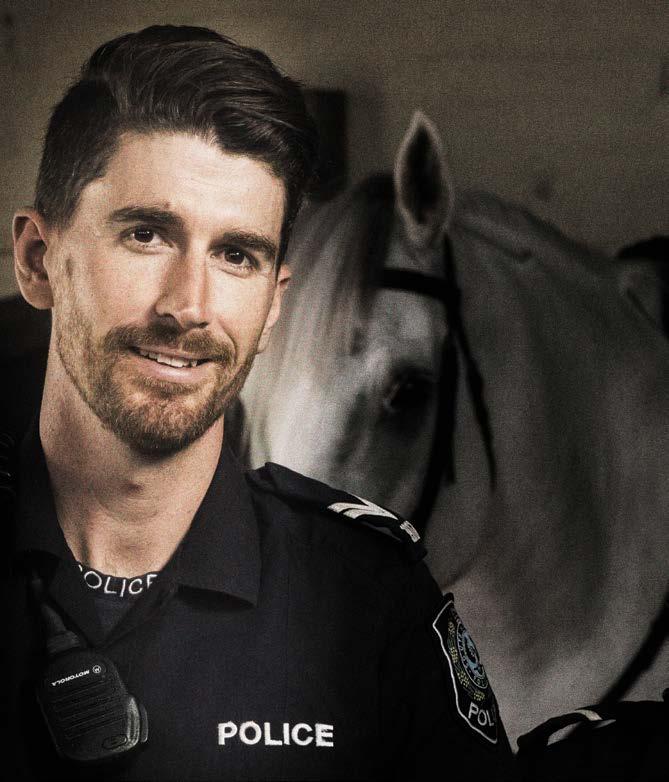
Dr Rod Pearce

The reduced quality or quantity of tears can lead to symptoms like tired eyes, burning, stinging sensations, and some vision fluctuation or disturbance
Any interruption of the tears, and a multiple of other things, can cause dryeye syndrome External factors, such as air-conditioned environments, can also exacerbate dry-eye symptoms
Treatment options typically include eye drops, gels or ointments, eyelid hygiene or warm compresses. For more severe cases, there are options of oral medications, or surgical or non-surgical procedures to the eye, with a focus on managing symptoms
Other symptoms that might suggest problems which come from the altered quality of tears include:
• Crusty eyes (excessive “sleep” in the eye)
• Blurred vision which changes after a blink
• Eyes feeling “heavy”, tired or fatigued
• Watery eyes (which might seem counter-intuitive but, if the surface of the eye dries out completely, one might have “reflex” tearing resulting in watery eyes).
• Difficulty wearing contact lenses comfortably
• Sensitivity to light
Tears are made in the tear glands under the eye lids The tears go onto the cornea like squirts of water onto a car windscreen and then drain down the ducts located on the inner eye, and down to the nose
As one ages, the amount of tears reduces and sometimes becomes exaggerated around menopause. Some medical conditions specifically damage the tear production with an autoimmune attack on the glands (Sjögren's syndrome, which also effects saliva)
The most practical advice about what sort to use if you need eye drops is to find some that are effective in reducing symptoms, don’t need to be put in too often, and are not too expensive.
The onset of Sjögren's typically occurs in one’s 40s, although many patients get diagnosed at a younger age Proper daily management and treatment for Sjögren's dry eye is important not only for comfort and sight, but to slow the progression of damage owing to the inflammation and impact of the disease
Medication – including oral contraceptives, antidepressants, antihistamines, diuretics and betablockers – can also alter the amount or quality of tears.
External factors and climatic conditions like dry air and wind, along with irritants such as cigarette smoke, dust or chemical exposure can upset tears A relatively new cause – thought to be triggered by infrequent or incomplete blinking – is associated with long periods of screen time
It is not always possible to cure dry eyes, but the condition can be successfully managed Treatment usually involves three basic strategies which essentially aim to increase tear production, maintain tear film volume, or prevent excess loss of tears.
A range of options can be used, including using eye drops, gels or ointments – sometimes called “artificial tears” – to lubricate the surface of one’s eyes
Inserting special plugs into the tear ducts can help stop the tears draining away and thereby prevent excessive loss
Dry eyes are sometimes secondary to inflammation of the eyelids (blepharitis)
Bacteria which normally live harmlessly on the skin can cause an infection of the eyelid margins. The result is crusting on the lashes or lid margins (particularly upon waking) and itchiness
If left untreated, blepharitis can stimulate inflammation and cause the eyelids to become red, swollen and irritated and disrupt normal tear production Although low-grade blepharitis is often a chronic condition, most cases respond well to appropriate management
Treatment includes cleaning around eyelid margins with a cotton bud or clean face cloth and eyelid scrub. One might need to use eye drops (artificial tears) or antibiotic ointments and medications.
It is a matter of treating the symptoms after looking for causes: deliberate blinking and monitoring how often you do that when looking at a screen Or, when you are working nights, remember that purposeful blinking helps tear production and aids corneal protection
A way of getting extra fluid into the eye is relatively novel: putting the tears onto the eyelid and, then, by blinking, the tears wash over the inside of the lid.
The myriad of artificial tears is evident if you go to a pharmacy. The most practical advice about what sort to use if you need eye drops is to find some that are effective in reducing symptoms, don’t need to be put in too often, and are not too expensive
Gels are often recommended at night so one can put them in before sleep and provide protection overnight If the preservatives are irritants, look at individual dosing packages (sometimes available on prescription but usually available over the counter).


Model Kia Carnival GT-Line Hybrid, $76,210 plus ORC
Drivetrain 1 6-litre turbocharged four-cylinder petrol engine, six-speed automatic, 54kW electric motor, FWD, 180kW/366Nm combined
Standard 12 3-inch infotainment display with sat-nav and 12-speaker Bose sound system, dual-zone climate-control air conditioning with rear controls, wireless Apple CarPlay and Android Auto, dual powered sunroofs
Safety Eight airbags including curtain airbag all three rows, five Top-Tether features and five ISOFIX child-restraint anchorage points, multi-view camera, front and rear parking sensors and a comprehensive suite of driver-assistance and crash-avoidance technologies .
Fuel 72-litre tank, regular unleaded, 5 . 8-litres per 100km (combined test).
Model Nissan Pathfinder ST-L large SUV
Price ST-L 2WD $59,670, ST-L 4WD $64,170
Drivetrain 3 5-litre V6 petrol, 202kW/340Nm, nine-speed auto with paddle shifters, 2WD or AWD
Fuel 71-litre tank, regular unleaded, 10 - 10 5 (2WD/4WD) litres per 100km (combined test)
Cargo Between 205 and 782 litres, cargo floor measures around 2,150mm x 1,240mm when rows two and three are folded flat
Towing Max braked towing 2,700kg, 270kg tow ball download, Tow mode and trailer stability programme
Warranty/ 10-year/300,000km warranty (providing serviced at correct intervals at a Nissan dealer), service servicing is fixed at $399 (first five services).

DESIGN AND FUNCTION
Nissan has introduced a new entry-level Pathfinder. ST-L 2WD (4WD optional) represents a $12,000 saving over the previous entry Ti 4WD variant
Despite its price advantage (over Ti and Ti-L) ST-L is no povo pack It sits on 18-inch alloys, has (74kg rated) roof rails, a powered rear tailgate with lip spoiler, dark privacy glass and LED lighting with auto high beam
Inside, the airy cabin is well laid out and very functional. A tall two-tiered centre console provides plenty of storage space
The upgraded eight-seat Kia Carnival “people mover” comes to the market in five equipment grades and a choice of V6-petrol, four-cylinder diesel or new hybrid drivetrains
Only available in top-spec GT-Line guise, the new hybrid is the most expensive model in the range It features a 1 .6-litre turbo four-cylinder petrol engine driving the front wheels through a six-speed automatic transmission coupled to a small electric motor.
Rather than van-based, the appearance of GT-Line Hybrid is of a modern, large SUV with a sporty front end, unique 19-inch alloys, long roof rails and smart rear tailgate
Inside, it oozes luxury It’s very spacious and offers flexible cargo and seating arrangements
Front seats are power-adjustable, heated and cooled. Rows two and three are accessed by large power-operated sliding doors (either side) complete with power windows and retractable sunshades.
The second row provides three individual seats with slide/recline functionality The centre seat converts to an armrest with table and cup holders Third-row (60/40) seats accommodate three in relative comfort with sufficient room for two adults
All seats are trimmed in perforated leather, and every seating position has access to overhead lighting, an air vent, cup and bottle holders and USB charging point. Available cargo space, when all seats are in use, is 627 litres Folding third-row seats into the rear well is a simple one-handed operation revealing a massive 2,827 litres of cargo space
Although weighing around 2,300kgs, Carnival GT-Line Hybrid’s 1 6-litre turbo-four and electric-motor combination produce enough grunt (180kW) to provide decent acceleration in any situation . So much so that
wheelspin can be a problem when taking off on poor surfaces
The combination never feels or sounds stressed and delivers smooth, effortless performance on the highway
Paddle shifters provide three-level regenerative braking in Eco and Smart drive modes and manual control over the six-speed auto in Sport mode
Carnival GT-Line affords good ride characteristics, agile cornering, good steering feel, and the brakes never feel underdone for such a heavy vehicle.
The driving position and forward visibility are excellent thanks to a (12-way) power-adjustable driver’s seat
A customizable 12 3-inch information display and clear head-up display keep drivers informed
There’s an easy-to-use rotary gearselection knob, an auto-off electric park brake and plenty of tech, including superb all-around camera views and a blind-spot camera view when indicating.
Console, dashboard and door trims feature soft materials with stylish contrasting stitching.
Trimmed in sturdy cloth fabric, three seat rows accommodate eight in relative comfort Front seats are heated, and the driver’s seat scores 10-way power adjustment The second row provides the usual 60/40 split/fold with slide and recline functionality and stacks of legroom
A single button-push provides easy access to the triple third-row seats Legroom is tight but sliding the second row forward can enhance it Generous cargo space includes a deep well under the rear floor. Central is a nine-inch touchscreen featuring satellite navigation, wireless Apple CarPlay, wired Android Auto and
DAB+ radio Tri-zone auto climate control features along with air vents to all three seat rows.
ST-L matches its more expensive siblings for safety with the same comprehensive suite of driver-assistance and crash-avoidance technologies and nine airbags (curtain airbags to all three rows)
Push-button keyless entry and start feature along with a stubby electronic gear shifter with push-button P (park) and an auto electric park brake. Smart analogue gauges flanking a seven-inch TFT information cluster and a clear 10.8-inch head-up display keep drivers informed
ST-L is fitted with a 3 5-litre V6 petrol engine coupled to a nine-speed automatic transmission with paddle shifters driving the front wheels . The (single-range) 4WD option gains seven drive modes including Sand, Mut/Rut and Snow
Although not as economical as some diesel and hybrid rivals, the V6 petrol is superb It’s got stacks of power and never runs out of puff Silky smooth by nature, it is rarely heard except at the highest revs It works in perfect harmony with the smooth auto making driving in any situation joyful and effortless
ST-L features Nissan’s PRO Pilot, a system designed to ease the driver’s workload by activating a level of semiautonomous steering, braking and acceleration






When it comes to getting behind the wheel of your dream car, two popular payment options often come to mind – financing through a car loan or leasing
So, what’s the difference?
A car loan is a loan that you take out to purchase a car, which you will pay back in regular repayments over a set period At the end of the loan period, you will own the car outright.
A car lease involves borrowing or renting a vehicle from a car dealer or car finance provider for an agreed period with regular repayments. When the lease period comes to an end, you can either extend the lease, trade it in for a newer model or pay the residual value of the car to own it outright
While leasing might seem appealing with its lower monthly payments and sometimes shorter loan terms, choosing a car loan is often a much more costeffective decision in the long-term
So, if a new car is on your wish list for 2025, a car loan might be a better option for you.
When you take out a car loan, you can make any changes or additions to the car as you please In contrast, leases are highly controlled in many ways, including loan structure, terms and not being able to purchase a used car from a private seller or choose your own insurer
As you don’t legally own the car when you lease it, you are unable to make any modifications (without permission) for things such as installing roof racks, upgrading the sound system or tinting
the windows. Many car leases also come with mileage restrictions, leaving you unable to go on too many road trips or weekend getaways
With a Police Credit Union car loan, you can enjoy flexibility on the type of car you purchase, with no restrictions on the age of the vehicle Our car loans can be used for any registrable vehicle like a boat or caravan Additionally, you have the option to make extra or early repayments without penalty, which could see you pay off your car sooner and make it yours. If you do choose a lease option, ensure that you read any contract carefully as there could be fine print and implications on your salary or taxation arrangements It’s always best to speak to a qualified professional when it comes to any financial matter that might be difficult to understand
At the completion of a car loan, you will own your car outright, with no surprise fees waiting for you. With a lease, the regular repayments do not pay down the whole principal amount This means that if you choose to keep the car at the end of the lease term, you will be required to pay a residual value of the car (commonly called a balloon payment) Sometimes this balloon payment can be higher than the car’s market value This will mean that if you sell the vehicle, you will be left with a balance/debt to reimburse.
Choosing to incorporate the balloon/ residual payment into the next lease agreement just increases your total debt and potentially your regular repayments
While leasing might seem appealing with its lower monthly payments and sometimes shorter loan terms, choosing a car loan is often a much more cost-effective decision in the long-term.
Owning the car at the end of the period is more cost effective than continuously leasing and you now have an asset rather than a liability
In many cases, leasing can have a higher interest rate than a car loan A Police Credit Union Low Rate car loan special offer* comes with a low competitive rate of 6 . 48% P. A . Comparison Rate plus NO monthly, annual or package fees. With no penalties for extra and early repayments, you could also pay off your car well before the end of the loan term Find out more at policecu.com.au.
TIP: compare different interest rates and the impact on repayments with the Loan Comparison Calculator and Basic Repayments – Car Loan Calculator on the Police Credit Union website policecu.com.au/calculators.
Continued page
Leading Adelaide law firm, Tindall Gask Bentley is the preferred legal services provider of the Police Association, offering 30 minutes of free initial advice and a 10% fee discount.
Leading Adelaide law firm, legal services provider of the Police Association, offering minutes of free initial advice
CRIMINAL & DISCIPLINARY
& DISCIPLINARY
• All criminal matters
• Commissioner’s Inquiries

• • Intervention orders
• Intervention orders
• Significant Incident Investigations

• Internal investigations (misconduct/discipline)
• Internal investigations (misconduct/discipline)
• Coronial Inquiries (deaths in custody)
• Coronial Inquiries (deaths in custody)
• Significant Incident Investigations
• ICAC (corruption) investigations
• ICAC (corruption) investigations
• Reviews of workplace decisions (suspension, admin orders, working restrictions)
• Reviews of workplace decisions (suspension, admin orders, working restrictions)
• Work injury compensation
• Work injury compensation
• Motor vehicle accident injury compensation
• Motor vehicle accident injury compensation
FAMILY & DIVORCE
& DIVORCE
• Public liability
• Public liability
• Income Protection and Superannuation (TPD) claims
• Income Protection and Superannuation (TPD) claims
Matrimonial, De Facto and Same-Sex Relationships
Matrimonial, De Facto and Same-Sex Relationships
• Property settlements
• Child Support matters


To arrange a preliminary in-person or phone appointment contact PASA on (08) 8212 3055













• Children’s issues
• Property settlements
• Children’s issues
WILLS & ESTATES
• Wills & Testamentary Trusts
• Wills & Testamentary Trusts
• Enduring Powers of Attorney
• Child Support matters
• Pre-nuptial style agreements
• Pre-nuptial style agreements






• Advice to executors of deceased estates
• Advice to executors of deceased estates
• Advance Care Directives
• Enduring Powers of Attorney
• Advance Care Directives
• Obtaining Grants of Probate
• Obtaining Grants of Probate
• Estate disputes
• Estate disputes
BUSINESS & PROPERTY
BUSINESS & PROPERTY
• General business advice
• General business advice
• Real estate & property advice
• Business transactions
• Business transactions
• Commercial disputes








• Real estate & property advice
• Conveyancing
• Conveyancing
• Commercial disputes






Adelaide | Reynella | Salisbury | Gawler | Mt Barker
Adelaide | Reynella | Salisbury | Gawler | Mt Barker Semaphore | Murray Bridge | Port Lincoln | Mannum | Whyalla Perth (WA) | Darwin (NT) | Brisbane (QLD) | Canberra (ACT)
Semaphore | Murray Bridge | Port Lincoln | Mannum | Whyalla Perth (WA) | Darwin (NT) | Brisbane (QLD) | Canberra (ACT)
tgb.com.au | (08) 8212 1077
tgb.com.au | (08) 8212 1077







Daniel Weekley Senior Associate Tindall Gask Bentley Lawyers

The Office for Public Integrity (OPI) oversees complaints and discipline matters for police in SA under the framework set out in the Police Complaints and Discipline Act 2016 (PCDA) The OPI handles complaints, conducts investigations, determines outcomes and imposes sanctions when necessary.
There is a perception that complaints are for corrupt officers . The reality, however, is that most officers involved in investigations under the PCDA are honest individuals who have made mistakes owing to the challenges of policing – regulatory burdens, understaffing, lack of resources and burnout
Police discipline ensures the integrity of the force and maintains public trust What sets South Australia apart from other states is the PCDA’s strict confidentiality provisions, making police discipline matters largely private.
Unlike other professions, the public cannot choose their police officer as they would a doctor or lawyer Given police powers — use of force, searches, detentions — many complaints arise, some made vindictively
The confidentiality provisions (sections 44 to 46 of the PCDA) benefit officers by ensuring that investigations and disciplinary proceedings remain internal Officers subject to professional discipline should have the chance to face sanctions, correct mistakes and get back to the important job of policing without their mistakes permanently prejudicing their careers and reputations
In an era of increased complaints, media scrutiny, and online threats, protecting the personal and professional reputations of police officers is critical.
With few exceptions, only individuals directly involved in an investigation are privy to complaint details, including:
• The complainant
• Internal Investigation Section (IIS) members, or police officers who have been required to deal with information during the course of their duties.
• The officer in question.
• Witnesses.
• The commissioner of police, the OPI, ICAC and the Police Disciplinary Tribunal
There are a few circumstances in which unauthorized people might become aware of confidential information relating to complaints or discipline matters:
• Through unlawful disclosure or unlawful publication
• Its release has been authorized by the commissioner, OPI or ICAC .
• The information has entered the public domain as a result of its lawful disclosure during court proceedings in a public and open court
Unauthorized disclosure or publication of information relating to a complaint made about a police officer under any of these circumstances is a criminal offence
The Crime and Public Integrity Committee has repeatedly reviewed the confidentiality provisions, facing strong opposition from media and other parties advocating for greater transparency. The Police Association remains the sole party firmly supporting the current confidentiality regime
If confidentiality provisions are weakened, allowing public access to complaints and officer identities, it would be disastrous Media sensationalism would tarnish officers' reputations, erode public trust in policing, and encourage complaints for ulterior motives. The job would become even harder.
In an era of increased complaints, media scrutiny, and online threats, protecting the personal and professional reputations of police officers is critical Confidentiality provisions must remain in place to safeguard members’ interests There is good reason that police officers subject to the disciplinary regime should benefit from confidentiality provisions unlike any other profession – because policing is a job like no other
Tindall Gask Bentley can provide confidential advice to Police Association members who might be concerned about confidentiality or anything relating to police complaints and discipline matters
Mark Smith Pan Macmillan
First rule of rescue: don't create another casualty. Grace Disher is about to face every teacher's worst nightmare. Three of her students are going to die.
On a high school camping trip, three boys slip away for an ocean swim By the time Grace catches up, the perilous surf conditions are overwhelming the teenagers
If she goes in, she will die trying to save them Should she have given her life? The question haunts Grace as investigations begin and her decision not to attempt a rescue comes under scrutiny
Hounded by conflicted staff, grieving parents and relentless media – all dissecting her actions, all looking for someone to blame – Grace's safety is compromised, and she must be careful who she trusts. And she's not the only one with a secret
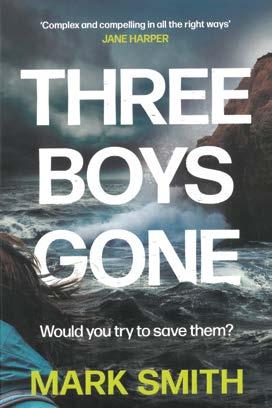
Win a book, an in-season movie pass or a DVD!
For your chance to win a book, an in-season movie pass (courtesy of Wallis Cinemas) or a DVD, send your name, phone number, work location and despatch number, along with your choice of book, movie and/or DVD to giveaways@pj.asn.au
Ross Judd Team Focus Plus
We can’t be perfect listeners all the time However, whether you’re managing a family or a business, Listening will help you learn how to listen properly in the moments when those closest to you need it most
When people feel nervous, worried, upset, or scared, they will often avoid talking about the real issue at heart. If you rush to address this initial topic by sharing your opinion, asking questions, telling stories or problem-solving, you’ll miss the deeper, underlying concern
To truly understand and connect, you need to listen in a deeper and more meaningful fashion Ross Judd offers a unique approach that goes beyond traditional listening skills His simple, effective, and powerful approach will transform your relationships and empower you to be the supportive presence they deserve


Scott Ryder Allen & Unwin

Kate Alice Marshall Pan Macmillan
When Theodora Scott met Connor — wealthy, charming, and a member of the powerful Dalton family — she fell in love in an instant Six months later, he’s brought her to Idlewood, his family’s isolated winter retreat, to win over his sceptical relatives.
Theo has tried to ignore the threatening messages on her phone, but she can’t ignore the footprints in the snow outside the cabin window or the strange sense of familiarity she has about this place Then, in a disused cabin, she finds something impossible: a photo of herself as a child A photo taken at Idlewood
Theo has almost no recollection of her earliest years, but now she begins to piece together the fragments of her memories Someone here has a shocking secret that they will do anything to keep hidden, and Theo is in terrible danger.
From the age of 12, Scott Ryder knew he wanted to join the army and signed up as soon as he could. After serving as a paratrooper and in East Timor with 3 RAR, he wanted more
He trained all summer and took the gruelling selection course for the commandos, earning the prized green beret on his second attempt
Forged in Fire takes goes inside the secretive world of the commandos Ryder shares battlefield stories from his tours to Afghanistan, where his regiment saw some of the heaviest fighting Australian forces had confronted since the Vietnam War.
After suffering serious injuries in a shocking Black Hawk helicopter crash in Kandahar, he was the only survivor to return to active service
Forged in Fire reveals the qualities of strength and mental resilience that characterize special-forces operators

Juan Gómez-Jurado Pan Macmillan
Antonia Scott knows exactly who sent her this message: the mysterious Mister White, whom she has been tracking for years.
She also knows that it is almost impossible to win against him But if she loses this game, Inspector Jon Gutiérrez will pay with his life
Antonia and Jon have one last chance: they must solve three cases that are considered unsolvable A game of life and death begins
The thrilling conclusion to Juan Gómez-Jurado's international best-selling Red Queen Trilogy

Roger A Price
1984: The Provisional IRA has attempted to kill the British prime minister and her cabinet in Brighton
Margaret Thatcher instructs the security services and Special Forces to work together to take the fight to the terrorists.
The SAS Red Troop is formed and led strategically, and for intelligence, by MI5’s Bertram Hastings, an unconventional but excellent field operative
Operationally, the troop is led by Captain Vernon Jackson who has as many detractors as supporters, but he gets things done Assisted by a team of seasoned soldiers, Jackson gets to work
He is tasked to identify and stop a Provisional IRA hardliner, Brendan Lynch, who is hell-bent on igniting a war to destroy all loyalist terrorists and drive all protestants out of Ulster.

Forensic accountant Christian Wolff has a talent for solving complex problems When an old acquaintance is murdered, leaving behind a cryptic message to “find the accountant”, Wolff is compelled to solve the case
Realizing more extreme measures are necessary, Wolff recruits his estranged and highly lethal brother, Brax, to help
In partnership with US Treasury deputy director Marybeth Medina, they uncover a deadly conspiracy, becoming targets of a ruthless network of killers who will stop at nothing to keep their secrets buried
Cast: JK Simmons (Ray King), Ben Affleck (Christian Wolff), Jon Bernthal (Brax), Cynthia AddaiRobinson (Marybeth Medina)

May 1
After finding themselves ensnared in a death trap, a group of supervillains is recruited to go on dangerous missions for the government. Thunderbolts*, an irreverent team-up featuring depressed assassin Yelena Belova alongside the MCU’s least anticipated band of misfits

The film also returns to the screen Marvel Cinematic Universe characters Bucky Barnes, Red Guardian, John Walker, Taskmaster, Ghost and Valentina Allegra de Fontaine, in addition to some exciting new faces
They must embark on a dangerous mission that will force them to confront the darkest corners of their pasts.
Cast: Florence Pugh (Yelena Belova), Sebastian Stan (Bucky Barnes), Olga Kurylenko (Antonia Dreykov), Lewis Pullman (Robert Reynolds), Julia Louis-Dreyfus (Valentina Allegra de Fontaine), Wyatt Russell (John Walker).

April 3
The Amateur April 10
Charlie Heller is a brilliant CIA decoder whose world comes crashing down when his wife dies in a London terrorist attack
When his supervisors refuse to take action, his intelligence becomes the ultimate weapon as he embarks on a dangerous trek across the globe to track down those responsible.

Cast: Laurence Fishburne (Henderson), Rami Malek (Charlie Heller), Rachel Brosnahan (Sarah), Holt McCallany (Moore), Alice Hewkin (Ali Park), Joseph Millson (Ellish), Tiffany Gray (Esther), Evan Milton (Slater)
Welcome to the world of Minecraft, where creativity doesn’t just help you craft, it’s essential to one’s survival.
Four misfits find themselves struggling with ordinary problems when they are suddenly pulled through a mysterious portal into the Overworld: a bizarre, cubic wonderland that thrives on imagination
To get back home, they’ll have to master this world (and protect it from evil things like Piglins and Zombies, too) while embarking on a magical quest with an unexpected, expert crafter
Together, their adventure will challenge all five to be bold and to reconnect with the qualities that make each of them uniquely creative – the very skills they need to thrive back in the real world.
Cast: Jack Black (Steve), Jason Momoa (Garett Garrison), Emma Myers (Natalie), Danielle Brooks (Dawn)



Whitstable Pearl series 3
270 minutes, $34 95
In season three, Pearl (Kerry Godliman) is fully immersed in her private investigating, leaving most of the running of the restaurant to Dolly and Ruby Mike (Howard Charles) has been away for a few months and arrives back a changed man – leaner, fitter and more Zen But will this last?
There is still a deep connection between them, but Pearl’s concern is more about Mike’s state of mind throughout the series
As their paths continually cross, solving Whitstable crimes, it becomes clear to Pearl that Mike is far from resolved with his wife’s death and is determined to help him find closure.
276 minutes, $34 95
Romantic comedy drama Under the Vines returns for a third season and features former Sydney socialite Daisy Monroe (Rebecca Gibney) and ex-London lawyer Louis Oakley (Charles Edwards)
The pair continues to run a small vineyard in New Zealand, while navigating their complicated love lives and scheming to oust an interloper who has laid claim to their vineyard. Daisy is also trying to plan her wedding, but is she marrying the right man?
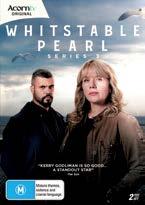





2.
3.
4.
5.
6.




SkyCity
January 11, 2025






SkyCity February 08, 2025
1.
2.
3.
4. Michael Constandaras and Olivia Ganz.
5. Rory Shannon, Alexander Barrett and Denzel Haselton.
6. Melanie Erlandsen and Jake Brooker.
7. Martin and Laura McHugh.







For the full version of The Last Shift, go to PASAweb at www.pasa.asn.au
Rob Badenoch
Guy Buckley
Sean Harrison
Greg Hutchins
Prime Ndikumwenayo
Troy Smith

Northern District
42 years’ service Last Day: 14 02 25
Comments…
“After 42 years in SA policing, and at the rank of superintendent, I am the last member of Course 2/83 to retire. While I’ve never been one for reunions and catch-ups, I’ve never failed to recognize the virtues of police culture
“The police life I signed up for in the 1980s would be inconceivable to most members today, at least those under 50 Present then, but missing today, was high morale, job satisfaction, the career-for-life credo, and effective policing concepts It all made for a near utopian working life
“That was because the executive management of the time had not fallen for concepts which were counterproductive in the realm of policing Blatantly problematic today, among other things, are:
• Woke corporatism
• Ideological alignments
• Lack of trust in members
• Over-reporting to, and as demanded by, the executive
• Policy shifts that impact the many for the errors of a few
• Decisions made not for members but out of the fear of media scrutiny.
“Executive management has badly missed the mark on so many fronts,
such as its failure to recruit and retain. Neither has it resolved the issues of understaffing and intensive workloads.
“And as for drawing back significant increases in bureaucracy – a move executive management championed – it still hasn’t happened
“Clear evidence of these factors lies in the current rate of resignations and contempt for executive management
“It’s not hard to establish that most cops consider the ELT completely out of touch And, from my own experience, it no longer understands the daily issues and pressures on our front-line operational members and support staff.
“The ELT is fooling itself if it thinks criticisms like mine are confined to a few fatigued rank-and-file frontliners The disaffection, I guarantee, extends up to my rank and beyond
“Unlike the members, the ELT seems to be exempt from facing any consequences for the fall of SA policing Just consider the bungled implementation of its ill-considered district policing model.
“I have never once heard an ELT member face up to hard questions from a tough, well-researched interviewer So, when ELT members get it wrong, to whom are they answerable? Not the public, not the media and certainly not their employees
“Premiers, police ministers and other parliamentarians say nothing They can’t be seen to interfere in operational police matters
“Clearly, my career was in two parts. The second was as a boss, and I delighted in backing my members, both sworn and unsworn, when others
sought to penalize them for mistakes which could have been used to educate and train rather than penalize and impugn
“To those members at Northern District, I thank you for my last few years. It was a pleasure serving with and for you.
“The delight of my early career was to serve alongside other rank-and-file members whom I still hold in the highest regard
“To all who remain in the job I wish the greatest of luck I’ll always be happy to discuss ideas, offer advice and assist the association ”
Troy Smith
EMR
31 years’ service Last Day: 28.11 . 24
Comments…
“Thank you to the Police Association for its unwavering support over my last 31 years of police service
“I especially thank everyone at the association (past and present) for the emotional and financial support you gave me over the last five years during my legal/work cover issues with SAPOL .
“I am and will be forever grateful to the association for being there in this time of need ”
Prime Ndikumwenayo
Netley Police Station
Two years’ service
Last Day: 21 01 25
Comments…
“It has been a pleasure to be part of SAPOL and the Police Association. I will forever be grateful for the time
I have spent with both organizations, especially the camaraderie, the support and all the help I have been given at both the academy and Netley Police Complex . ”

EMR
46 years’ service Last Day: 22 01 25
Comments…
“I thank the association for its work, during my 46-year career, in assisting to gain the conditions and pay we receive
“Thanks to all the people I have worked with, and for, over the years Your company, support and work efforts will always remain with me ”

Sean “Harry” Harrison
Southern Property Store
35 years’ service Last Day: 05 02 25
Comments…
“It’s been a pleasure Had some great times amongst the bad ones Great memories and some bad ones Always had great mates to laugh with – the most important thing in policing. ”

EMR
47 years’ service Last Day: 22 01 25
Comments…
“Time has come for me to embark on a new chapter in life – retirement Like many of my era, I was straight out of year 11 and off to the academy just after turning 17.
“I immediately had 32 new friends, and many of these I am grateful to say are now lifelong friends and I was now part of the big blue machine
“I worked with so many great people and would do it all again in a heartbeat I feel very honoured to have been a police officer and having worked in so many diverse areas all with their own unique challenges
“I loved the job, the people and what policing stands for and I will always have a keen interest in what is happening, knowing that all of you are working so hard in the pursuit of good.
“I wish everyone all the very best, and I whole-heartedly thank the Police Association for all the work it has done and continues to do ”
From page 31
From page 37
The DPM is overwhelmingly flawed: it cannot, and will not, receive full staffing for years and is clearly unfit for purpose.
Since 2018, SAPOL has been ineffective in securing any commitment from government insofar as sworn staffing. It has not even been able to maintain the 2018 sworn staffing benchmark
And, had the Police Association not run its Recruit 313 campaign in 2018 and secured funding for 168 police security officers during COVID-19, the DPM would be performing even more poorly
Moreover, law and order in Hindley St was headed for collapse under the failed DPM until the Police Association initiated a public campaign in 2021 . SAPOL had neglected to implement dedicated foot patrols on the entertainment strip.
The prediction, insofar as the workforce profile, is that many long-term employees will look to retire in the next 10 years SAPOL must therefore invest in regional areas and implement a policing model which will retain employees and provide the community with adequate service
On top of the balloon payment, some leasing agreements incorporate mileage and “wear and tear” costs which you might need to pay at the end of the lease What’s more, if your personal circumstances change during the term of the lease and you need to break the lease or want to pay out early, you will often face some significant prescribed penalties
Leases tend to have regular ongoing annual or monthly fees and application fees at the start With a Police Credit Union car loan there are no surprise fees. In fact, you will pay $0 in annual, monthly and package fees.
People who take the car leasing route often find they must wait to receive their car In contrast, with a car loan from
Police Credit Union, with all the correct documentation and meeting all the requirements, our Platinum members could apply and drive off in a new car on the same day^.
With NO annual, monthly or package fees, flexibility to choose a car of your choice and the option to make additional payments without penalty, a Police Credit Union Low Rate car loan special offer is the key to opening your next car door
Members can also offset their car emissions for the term of the loan at no extra cost#. To chat about a car loan through Police Credit Union, contact your local Platinum relationship manager, Glenn Lewis, on 0421 243 741 or Ryan Mountford on 0437 286 804 . Visit policecu.com.au to find out more about Police Credit Union’s competitively low rates
Police Credit Union Ltd (PCU) ABN 30 087 651 205 AFSL/Australian Credit Licence 238991. Terms, conditions, fees, charges, lending and membership criteria apply. Full details upon request. All information is correct and current as at 05/02/2025 and are subject to change. *Special Offer ends 30/06/2025. No further discounts apply. ^Conditional approval and funding valid business hours only Monday to Friday if applications are submitted prior to 10am with required identification and information documents. #Estimated Car emissions will be offset for the term of the loan. The information provided herein does not take into account your personal needs, objective and financial circumstances. Please consider your circumstances before deciding if the product is right for you. Target Market Determinations are available at policecu.com.au/target-market-determination or by calling 1300 131 844. PCU reserves the right to withdraw offers or amend product features at any time. Information provided in this article is designed to be a guide only and was believed to be correct at time of publication and derived from various media sources. In some cases, information has been provided to us by third parties and while that information is believed to be accurate and reliable, its accuracy is not guaranteed in any way. Any opinions expressed constitute our views at the time of issue and are subject to change. Neither PCU, nor its employees or directors give any warranty of accuracy or accept responsibility for any loss or liability incurred by you in respect of any error, omission or misrepresentation in this article.









